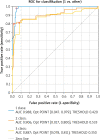Prediction of climacteric syndrome development in perimenopausal women with hypothyroidism
- PMID: 36704769
- PMCID: PMC9871991
- DOI: 10.5114/pm.2022.123522
Prediction of climacteric syndrome development in perimenopausal women with hypothyroidism
Abstract
Introduction: The study aim was to predict the risk of climacteric syndrome (CS) developing in perimenopausal women with hypothyroidism (HT) according to the developed algorithm and mathematical model for timely preventive measures.
Material and methods: 146 perimenopausal women with autoimmune HT were enrolled in this study. Assessment of the severity of metabolic, neurovegetative and psychoemotional symptoms was graded according to the Blatt-Kupperman menopause index. All women were interviewed according to a specially designed questionnaire for predicting the development of severe CS. Multiple regression analysis was used to build a multifactorial mathematical model. Shapiro-Wilk and Kolmogorov-Smirnov criteria were used to assess the normality of the distribution of traits.
Results: Regression analysis was used to determine the most significant multicollinear risk factors for CS developing: pathology of the thyroid gland, smoking, alcohol consumption, adverse environmental conditions, low physical activity, history of stress and anxiety. The predicted value of the risk factor for severe CS with a high degree of probability was determined in 72 (49.32%) women, medium probability in 58 (39.73%) women, and low probability in 16 (10.95%) women.
Conclusions: The developed algorithm and mathematical model are informative and allow one to prevent CS and its complications. The decay of women's health starts many years before menopause and prevention of its consequences is an important task for the clinicians.
Keywords: climacteric syndrome; hypothyroidism; mathematical model; perimenopause; women.
Copyright © 2022 Termedia.
Conflict of interest statement
The authors report no conflict of interest.
Similar articles
-
[Perimenopausal melatonin deficiency syndrome in system of personalized management of quality of life of women with climacteric syndrome.].Adv Gerontol. 2019;32(4):516-523. Adv Gerontol. 2019. PMID: 31800178 Russian.
-
The 5HTT and MAO-A polymorphisms associate with depressive mood and climacteric symptoms in postmenopausal women.Prog Neuropsychopharmacol Biol Psychiatry. 2013 Aug 1;45:125-30. doi: 10.1016/j.pnpbp.2013.05.007. Epub 2013 May 23. Prog Neuropsychopharmacol Biol Psychiatry. 2013. PMID: 23707423
-
[Analysis of relationships between perimenopausal symptoms and professional functioning and life satisfaction--Subjective perception of the dependence in women aged 40+].Med Pr. 2015;66(3):351-8. doi: 10.13075/mp.5893.00243. Med Pr. 2015. PMID: 26325048 Polish.
-
Assessment of the climacteric syndrome: a narrative review.Arch Gynecol Obstet. 2021 Oct;304(4):855-862. doi: 10.1007/s00404-021-06139-y. Epub 2021 Jul 6. Arch Gynecol Obstet. 2021. PMID: 34231082 Review.
-
Menopause or climacteric, just a semantic discussion or has it clinical implications?Climacteric. 2014 Jun;17(3):235-41. doi: 10.3109/13697137.2013.838948. Epub 2013 Nov 7. Climacteric. 2014. PMID: 23998690 Review.
Cited by
-
Approach to prediction and receiver operating characteristic analysis of a regression model for assessing the severity of the course Lyme borreliosis in children.Reumatologia. 2023;61(5):345-352. doi: 10.5114/reum/173115. Epub 2023 Oct 31. Reumatologia. 2023. PMID: 37970115 Free PMC article.
References
-
- Santoro N, Roeca C, Peters BA, et al. . The menopause transition: signs, symptoms, and management options. J Clin Endocrinol Metab 2021; 106: 1-15. - PubMed
-
- Inayat K, Danish N, Hassan L. Symptoms of menopause in peri and postmenopausal women and their attitude towards them. J Ayub Med Coll Abbottabad 2017; 29: 477-480. - PubMed
-
- Uygur MM, Yoldemir T, Yavuz DG. Thyroid disease in the perimenopause and postmenopause period. Climacteric 2018; 21: 542-548. - PubMed
LinkOut - more resources
Full Text Sources

